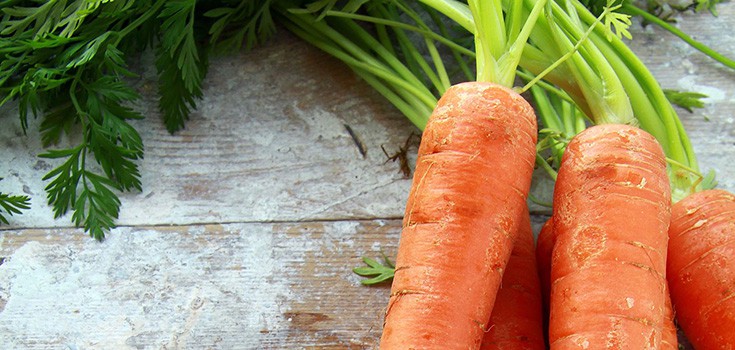Compounds in Fruit and Vegetables Tied to Reduced Cancer Risk

Carrots aren’t only a good introduction to the world of vegetables, they are a powerful health food. There is bountiful research that links these root veggies with numerous benefits, including a reduced risk of heart disease, better vision, and now, breast cancer prevention.
According to researchers from Harvard Medical School, the anticancer benefits of carrots are found in carotenoids—active beneficial compounds that give many vegetables their rich colors.
Harvard scientists found that women who have higher carotenoid levels in their blood have a lower risk of breast cancer when compared with those women who have lower carotenoid levels.
The study abstract concluded with:
“This comprehensive prospective analysis suggests women with higher circulating levels of α-carotene, β-carotene, lutein+zeaxanthin, lycopene, and total carotenoids may be at reduced risk of breast cancer.”
Their findings, which can be seen in the Journal of the National Cancer Institute, came from eight different trials involving 3,000 women with breast cancer and 4,000 without.
“We have said if we want to reduce the risk of cancer—not just breast cancer—eating a plant-based diet low in fat and animal protein may help,” said Dr. Stephanie Bernik, Lenox Hill Hospital Chief of Surgical Oncology. “This study, like others, suggests this is the case.”
As Dr. Bernik said, this isn’t the first research to suggest such a carotenoid-cancer prevention link. Researchers with Boston University found that cruciferous vegetables including carrots can help lower the risk of breast cancer overall.
Their study, part of the Black Women’s Health Study, initially focused on ER-negative breast cancer, a cancer common among African-American women. They found that these vegetables not only reduced that cancer, but other forms of breast cancer as well.
Carotenoids, like those that give carrots their orange (and sometimes red or purple) hue, work to enhance immune function, promote proper communication between cells, and increase antioxidant activity. These benefits all play an important role for fighting a variety of diseases, including cancer.
To get the very most anti-cancer benefits of carrots, you want to make sure you consume them with dietary fats. Carotenoids are fat-soluble, meaning they need dietary fats to be processed and absorbed by the body. Try eating them in your salad with olive oil or avocados (both valuable sources of dietary fats). If you cook them, do so lightly in a bit of olive or organic coconut oil.
Interestingly, boiling whole carrots could increase the concentrations of some compounds, like falcarinol, by 25%. Boiling sliced carrots, however, could have the opposite, negative effect.
